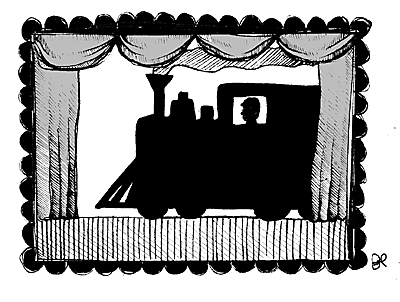
Illustration by Patricia Tompkins
|
|
By Lori Foley
Arizona Daily Wildcat
Thursday, October 13, 2005
Print this
I went to see a play the other night. This being Tucson, in the middle of the performance a train went by somewhere outside the theater, and the dialogue was barely audible over the sound of the whistle. I sat annoyed for a while at this obnoxious intrusion of real life in the fantasy I'd been enjoying watching.
There's a play that many of us like to imagine about democracy. Like a lot of plays, it has a neat beginning, middle and end. In the opening act, a constitution is drafted. In the middle, a joyous and grateful people ratify it, each member represented. At the conclusion of the final act, the players take their bows and waltz off stage, confident in the new life democracy will offer.
While many Americans try hard to envision that play being staged right now in Iraq, the train that is reality barrels though and it's hard to hear the imagined, genteel dialogue over its shrill whistle.
The U.S. government has waited with bated breath for the constitution that the Iraqi people are working to craft and ratify right now. It's not coming as easily as was once anticipated. We've seen democracy face many setbacks, from the U.S. military's postponement, in June 2003, of all local elections, to the current difficulties in drafting a constitution that fairly represents all members of Iraq's schismatic ethnic groups.
It was easy to hope that, with the fall of Saddam Hussein's regime, we'd see the nearly immediate creation of a free-market, multiethnic democracy that would bring stability to the country, and perhaps, by example, the region.
But democracy isn't easy. To view it as a quick, magic cure for a country's problems is unrealistic - and unfair, both to the form itself and the people it affects.
What matters now is that whatever our opinions about the U.S. presence in Iraq, we do not forget the complex and difficult reality of building a democracy.
Simply put, democracy is a tool designed to protect people's liberty. To expect the creation of this tool practically overnight could result in the construction of a blunt instrument, useful only for deepening the chasms between Iraq's ethnic groups.
The creation of American democracy as we know it today certainly wasn't a particularly quick task. The original Constitution excluded everyone but landed white men from political dialogue.
Even almost 50 years after the Declaration of Independence, only 5 percent of adults cast ballots in the presidential elections - certainly a far cry from the participatory, all-inclusive democracy we're waiting for the Iraqis to establish. It's tempting but unfair to expect perfect success in a matter of months.
The potential of a rushed democracy to strip citizens of liberty is dangerous in a country like Iraq, where ethnic divisions run deep and bitterness is rampant. Post-communist Yugoslavia shared many of the same troubles.
The quickly established democracies of ex-Yugoslavian territories did not install enough protections against the volatility of the ethnic groups living in the region; leaders were quickly elected democratically, but on platforms of hate, spewing messages of ethnic separatism and even genocide.
Does this mean that democracy is not the best option for the Iraqis? Certainly not. It's simply a sobering reminder that democracy is only a tool - not a panacea for decades of disaster - and that we must allow Iraq to take the time it needs to develop a sustainable democracy that protects its citizens from future instability among its divided ethnic groups.
We must not expect an overnight cure-all, nor can we forget that democracy is a tool (albeit a powerful and wonderful one) to protect human liberty, not an end in itself. We owe it to the future, both the Iraqis' and our own.
Producing a constitution will not mean all of Iraq's troubles are solved, but nor will problems therein mean that there's no hope for the future. So, when the constitution that has been drafted is brought to vote Sunday, the world will be watching to see Iraq's first steps toward democracy.
Let's bring an end to expectations of a quick miracle cure, to valuing the tool of democracy and a speedy timeline over the people it's supposed to serve. Instead, we'll watch with two of the things Iraq needs most from its global audience: patience and understanding.
Lori Foley is a senior majoring in French and English. She can be reached at letters@wildcat.arizona.edu.
